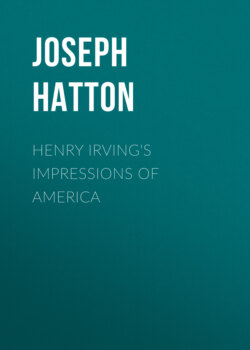Читать книгу Henry Irving's Impressions of America - Joseph Hatton - Страница 9
На сайте Литреса книга снята с продажи.
V.
ОглавлениеTable of Contents
Genius is rarely without a sense of humor. Mr. Irving has a broad appreciation of fun, though his own humor is subtle and deep down. This is never better shown than in his Richard and Louis. It now and then appears in his conversations; and when he has an anecdote to tell he seems to develop the finer and more delicate motives of the action of the narrative, as if he were dramatizing it as he went along. We dropped our main subject of audiences presently to talk of other things. He related to me a couple of stories of a “dresser” who was his servant in days gone by. The poor man is dead now, and these incidents of his life will not hurt his memory.
“One night,” said Irving, “when I had been playing a new part, the old man said, while dressing me, ‘This is your masterpiece, sir!’ How do you think he had arrived at this opinion? He had seen nothing of the piece, but he noticed that I perspired more than usual. The poor fellow was given over to drink at last; so I told him we must part if he did not mend his ways. ‘I wonder,’ I said to him, ‘that, for the sake of your wife and children, you do not reform; besides, you look so ridiculous.’ Indeed, I never saw a sillier man when he was tipsy; and his very name would set children laughing—it was Doody. Well, in response to my appeal, with maudlin vanity and with tears in his eyes, he answered, ‘They make so much of me!’ It reminded me of Dean Ramsay’s story of his drunken parishioner. The parson, you remember, admonished the whiskey-drinking Scot, concluding his lecture by offering his own conduct as an example. ‘I can go into the village and come home again without getting drunk.’ ‘Ah, minister, but I’m sae popular!’ was the fuddling parishioner’s apologetic reply.”
A notable person in appearance, I said just now. Let me sketch the famous actor as we leave his rooms together. A tall, spare figure in a dark overcoat and grayish trousers, black neckerchief carelessly tied, a tall hat, rather broad at the brim. His hair is black and bushy, with a wave in it on the verge of a curl, and suggestions of gray at the temples and over the ears. It is a pale, somewhat ascetic face, with bushy eyebrows, dark dreamy eyes, a nose that indicates gentleness rather than strength, a thin upper lip, a mouth opposed to all ideas of sensuousness, but nervous and sensitive, a strong jaw and chin, and a head inclined to droop a little, as is often the case with men of a studious habit. There is great individuality in the whole figure, and in the face a rare mobility which photography fails to catch in all the efforts I have yet seen of English artists. Though the popular idea is rather to associate tragedy with the face and manner of Irving, there is nothing sunnier than his smile. It lights up all his countenance, and reveals his soul in his eyes; but it is like the sunshine that bursts for a moment from a cloud, and disappears to leave the landscape again in shadows, flecked here and there with fleeting reminiscences of the sun.
The management of the Lyceum Theatre has a moral and classic atmosphere of its own. A change came over the house with the success of “The Bells.” “Charles I.” consummated it. You enter the theatre with feelings entirely different from those which take possession of you at any other house. It is as if the management inspired you with a special sense of its responsibility to Art, and your own obligations to support its earnest endeavors. Mr. Irving has intensified all this by a careful personal attention to every detail belonging to the conduct of his theatre. He has stamped his own individuality upon it. His influence is seen and felt on all hands. He has given the color of his ambition to his officers and servants. His object is to perfect the art of dramatic representation, and elevate the profession to which he belongs. There is no commercial consideration at work when he is mounting a play, though his experience is that neither expense nor pains are lost on the public.
